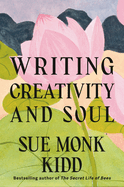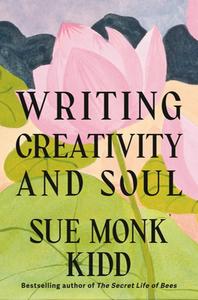
 Sue Monk Kidd's ninth work, Writing Creativity and Soul, deftly blends practical craft advice and spiritually minded self-help as she traces her development as a writer.
Sue Monk Kidd's ninth work, Writing Creativity and Soul, deftly blends practical craft advice and spiritually minded self-help as she traces her development as a writer.
Kidd (The Invention of Wings; The Book of Longings) observes that her books share "a submerged female longing for voice and self-identity." Growing up in the South in the 1950s, she learned girls must be quiet, polite, and conventional. On her 30th birthday, though, the nurse and married mother of two declared she was going to become a writer, despite her high school guidance counselor having told her it was not a career for a woman, only a hobby. During the postwar baby boom, her great-uncle gave his nieces and nephews $100 for each child. However, when Kidd was born, he handed her mother a check for $99.99--"a penny less because Sue's a girl." Although she didn't hear that family story until later in life, that missing penny has been a spur ever since.
The opening section, "Moorings," recounts moments from Kidd's apprenticeship. She knew from age six that she wanted to write, but her actual career started inauspiciously when a short story she submitted to a regional magazine was returned with a note reading "THIS IS USELESS!" She remembers going to a Maya Angelou lecture and hearing her boil down the requirements of writing to three things: "First, you need something to say. Second, you need the ability to say it. Finally, you need the courage to say it at all." Honing her skills and finding confidence took many years; she offers shortcuts to both.
The "Mystery" and "Method" sections consider stories' sources and the nitty-gritty of their construction. Kidd gives pointers for mining characters' motivations and achieving a good pace and sense of place. Her specialty, she notes, is first-person female narrators who experience an "exodus." Aristotle's Incline (opening hook, three plot points, catharsis, and wrap-up) is her paradigm, but she encourages beginners to discover what works for them. She also addresses the specific challenges of memoir, which "not only takes me into myself" but "frees me from myself." The final part, "Meaning," reflects on how writing has connected her with family and strangers alike.
The book flows easily, its rapid-fire chapters interspersing writing tips with pilgrimages to the homes of literary role models, examples from her books and others', and inspirational quotations. A trove for Kidd's fans, this accessible toolkit for budding authors is also suited to readers of Elizabeth Gilbert's Big Magic. --Rebecca Foster, freelance reviewer, proofreader, and blogger at Bookish Beck
Shelf Talker: The Secret Life of Bees didn't come out of nowhere; in her craft-meets-self-help book, Sue Monk Kidd traces her decades-long writing apprenticeship, relaying what she has learned and what it means.

